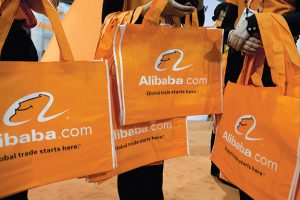Bloomberg
Alibaba Group Holding Ltd may attract at least $16 billion of Chinese money by shifting to a primary listing in Hong Kong, strategists say, getting a much-needed boost as its stock struggles to bottom out.
The move paves the way for the e-commerce giant to be included in the city’s trading links with mainland bourses, allowing an influx of new capital. Chinese investors hold around 7% stake of firms included in the links, suggesting an inflow of $16 billion into Alibaba over the next few years, according to Goldman Sachs Group Inc. Sanford C. Bernstein estimates $21 billion.
Such hopes are timely for Alibaba, whose stock is still down more than 60% from an October 2020 peak as brief bouts of recovery this year have failed to last amid regulatory fears. Elevating its listing status from secondary will also help firm cut reliance on investors in the US and prepare for an eventual delisting there as an auditing standoff between Washington and Beijing continues.
“It opens up an efficient portfolio flow channel for Hong Kong-listed companies to expand their investor base and tap into the deep onshore equity liquidity pool,†Goldman Sachs strategists including Kinger Lau wrote in a note on Wednesday.
Mainland funds tend to be contrarian investors, loading up on shares of the nation’s tech giants even as foreigners sell. Tencent Holdings Ltd. has been the most purchased Hong Kong-listed stock via the trading links since the tech rout deepened from February 2021, while Meituan and Xiaomi Corp. also rank among top of their shopping list, Bloomberg-compiled data as of end-May show.
“There are still some in the mainland who hold on to belief in the power of the internet economy,†said He Qi, fund manager at Huatai Pinebridge Fund Management. “Being able to buy Alibaba shares with yuan will be good for its valuation. I think that a valuation increase of 50% from current levels is reasonable.â€
The listing move can also boost Alibaba’s trading turnover in Hong Kong. Although more than a half of its shares have been registered in the city’s clearing system, the stock’s turnover has remained at just one fifth of that of American Depositary Receipts in the first six months of 2022.
“I will regard this as a preparatory and proactive measure for the potential involuntary delisting from the US due to accounting records issue faced by Chinese issuers,†said Billy Au, partner of Mayer Brown.
While Li Auto Inc. has gained about 26% since its primary listing allowed the Chinese electric-vehicle maker to join the Stock Connect program in March, its peer XPeng slumped more than 30% after being added in February. Both companies are also listed in the US.
After a nearly 5% jump in Hong Kong, Alibaba falls 3.3% on Wednesday as focus shifted to next week’s earning results. Alibaba is expected to report its first-ever negative quarterly revenue growth amid a slowdown in Chinese economy and fierce competition.
“The internet dividend has evaporated, and its potential inclusion in the Connect, for me, would not be a sufficient reason to load up on Alibaba shares in the short term,†said Zhang Hao, chief investment officer at Granford (Beijing) Capital Management Co.
But still, many see this as another sign that the regulatory headwind that’s been capping tech’s rebound is clearing.
“This may signify that Baba’s regulatory overhang might be near the end as management is unlikely to approach this primary listing if there are still major potential regulatory issues to be resolved,†said Zhikai Chen, head of Asian and Global Emerging Market Equities at BNP Paribas Asset Management.
 The Gulf Time Newspaper One of the finest business newspapers in the UAE brought to you by our professional writers and editors.
The Gulf Time Newspaper One of the finest business newspapers in the UAE brought to you by our professional writers and editors.
